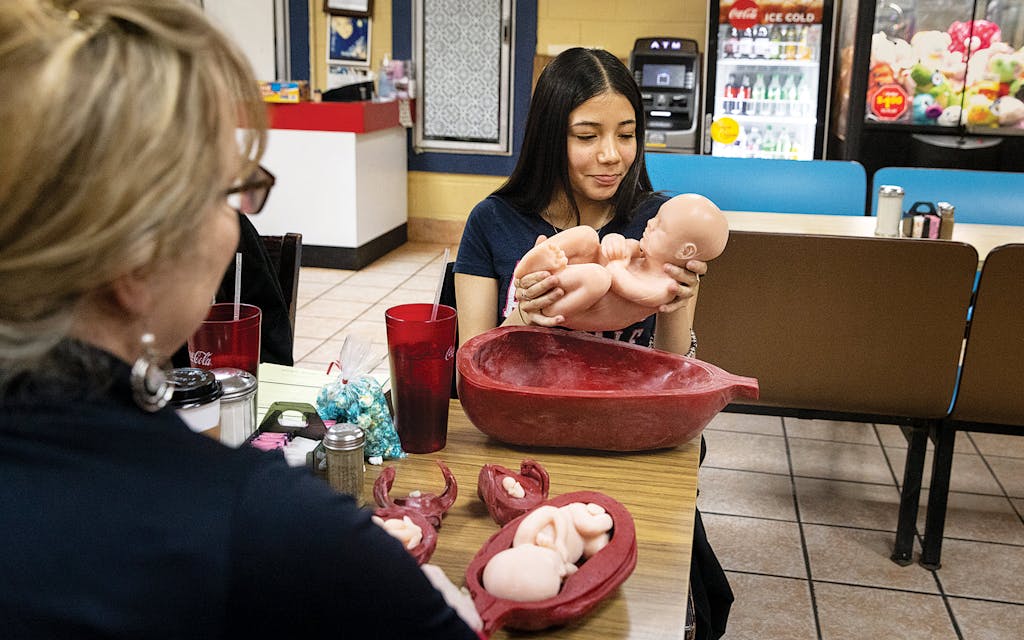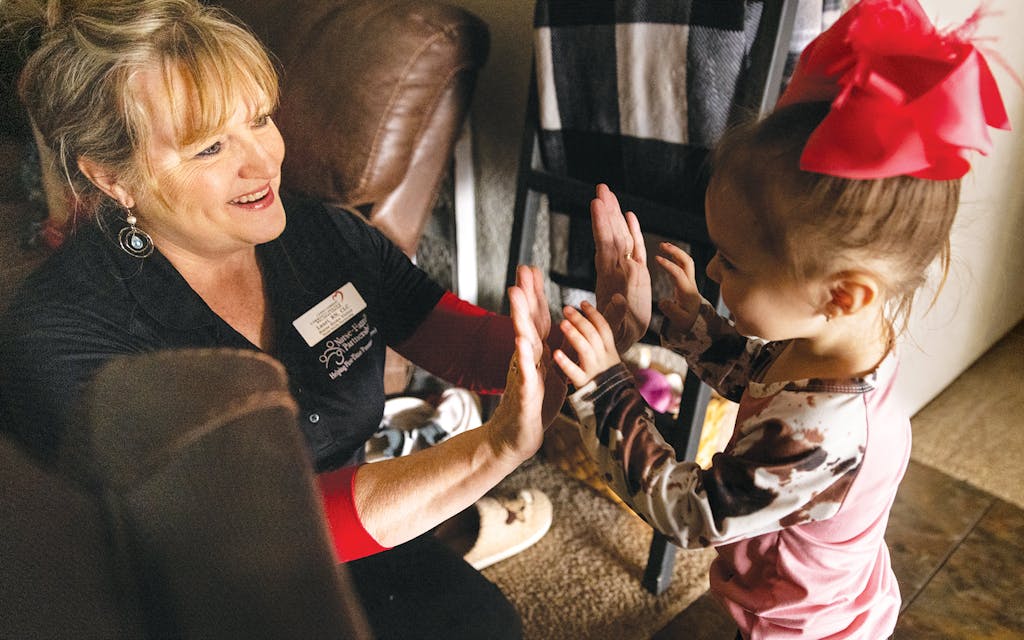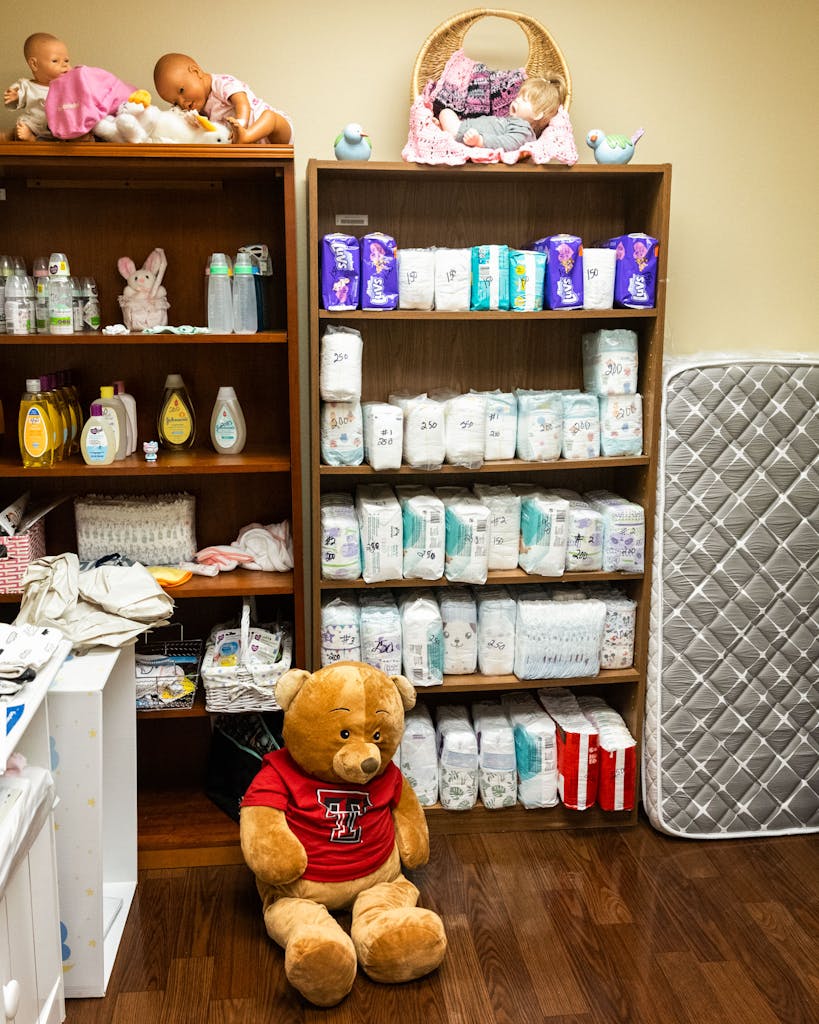Beside Angel Perez’s plate of congealing cheese fries sit what look like four disembodied wombs—rubber cross sections depicting the progression of a woman’s pregnancy. The seventeen-year-old plucks one fetus from its uterus and cradles it in her palm, petting it with her finger. It’s the size of a baby mouse, typical of human development ten weeks after fertilization.
Across the table, nurse Lauri Mannon gestures at the next-biggest womb, the week-sixteen model. “You’re somewhere between these two,” she tells Perez, who is fourteen weeks pregnant, before hoisting a fifth womb, the forty-week version, up from the floor. Perez’s big brown eyes widen at the sight of the fully formed fetus, with its discernible features and tiny fingers and toes.
It’s early November and only the second time the two have met. If all goes according to plan, it will be far from the last. Mannon works for Nurse-Family Partnership, a federally funded program that provides prenatal and postpartum support to first-time mothers until their baby’s second birthday. The Lubbock office that employs her is one of the state’s 23 local NFP programs, which operate both in the largest metropolitan areas and in sparsely populated communities.
Their clients are poor and nearly all on Medicaid. Often they’re teenagers. The program aims to help new mothers and their babies through regular visits by specially trained nurses. Such efforts are more vital than ever in Texas, where the maternal mortality rate is 20 percent higher than the national average and nearly three times greater than California’s.

The rate in Texas has more than doubled during the past two decades and is especially high among mothers of color, who experience higher rates of teen pregnancy. According to a recent study by the nonprofit March of Dimes, 46.5 percent of the state’s counties are maternity-care deserts—lacking birthing facilities or prenatal providers—compared with 32.6 percent nationally.
Among the areas where Texas mothers are particularly vulnerable to health complications or death related to pregnancy or childbirth is Lynn County, where Perez lives in the tiny town of O’Donnell. She must drive nearly an hour north to visit her obstetrician at a clinic in Lubbock. But nurse Mannon comes to her, agreeing to meet this day at George’s Restaurant, in Tahoka, about fifteen minutes up the road from O’Donnell.
Perez and her 37-year-old stepmother, Jessica Martinez, who accompanied her, had hoped George’s would be a less raucous environment than their home. They live with Perez’s six siblings, who range in age from eleven months to sixteen years, as well as her grandmother, two cats, a dog, and two snakes. But the restaurant fails to provide much respite.
A group of cheerleaders, roughly Perez’s age, their faces decorated for a Friday night game, squeal with laughter at a nearby table. At another sit four older men, who peer curiously over at the fetus models. “It ain’t mine!” one of them shouts to ensuing laughter, while Perez smiles sheepishly.
Mannon has brought a onesie in a gift bag, which Perez graciously accepts. NFP nurses routinely bestow small presents (tummy-time mats, books) on their clients to mark various milestones. This memento is in celebration of Perez’s recent gender-reveal party. It’s a girl, which makes Perez anxious because of her own childhood experiences. At age nine, she was raped. “That’s what makes me scared,” she explains.
Mannon takes notes as she runs through a checklist of questions. “Are you feeling any movement yet?” she asks. Perez answers that she felt the baby flutter while she was at school and texted her stepmom asking whether it wasn’t too early for that. Mannon nods. “The thinner you are, the more likely you are to feel the baby move,” she says, adding that by the sixteenth week it will likely happen daily.
Standing five foot one inches tall and weighing 106 pounds, Perez rises from her seat and hikes up her Stranger Things sweatshirt to reveal a silver belly button ring and only the slightest curvature to her otherwise flat stomach. Her first trimester had been awful, she says. She couldn’t keep food or drink down, and the nausea wasn’t confined to the mornings—far from ideal for a girl trying to finish her senior year of high school.
“Any anxiety? Depression?” Mannon asks. Perez answers that she has battled mental health issues in the past, especially after her father shot himself in front of her and her siblings when she was fourteen. Mannon is just learning of this tragedy, and yet she seems unfazed. (“I don’t know that I would hear anything at this point that would shock me,” she tells me later, back in her car.)
Perez still grapples with anxiety occasionally, but the depression has dissipated. “Since I’ve been pregnant,” she says, “I’ve been happy.”

In Lubbock, the big news of the week is that a well-fed possum found its way onto the Texas Tech University football field during a game against Texas Christian University; it was captured short of the 20-yard line. A week before that, Lubbock County became the fourth county in Texas to enable private citizens to sue anyone who helps pregnant women get an out-of-state abortion. I was asked by the leadership of the Lubbock branch of NFP to avoid “political questions,” so when I join a group of its nurses at a La Madeleine cafe in a strip mall, we steer clear of the subject.
The mood among the ten women gathered around a long table is lighthearted. They hold these team meetings weekly—to share their experiences, commiserate about difficult clients, and brainstorm solutions. They comprise a diverse group in terms of age, ethnicity, and race. The youngest, 28-year-old Taylor Ross, gave birth to a son when she was 17, an experience that has helped her connect with teenage clients. “I just think about how much I would have benefited from this program,” she says. “Luckily I had a really supportive family.”
Lubbock’s NFP program partners with Texas Tech University Health Sciences Center, and that affiliation with a widely respected local institution is helpful, especially when nurses make cold calls to potential clients who are often referred by doctors, pregnancy-testing centers, or Child Protective Services. Other NFP offices are similarly aligned with Baylor College of Medicine, in Houston, and Texas A&M University, in College Station, as well as with community-based groups and services such as Catholic Charities in San Antonio.
Each nurse handles about 25 mothers, meeting each once or twice monthly. The work can be emotionally and physically taxing. Those who traverse the farthest reaches of the nine counties the office serves clock as many as one thousand miles a month. Often the situations they encounter aren’t pretty. “It can be down, dirty, and ugly,” says Sonya Flores, the nurse supervisor in Lubbock.
Sometimes the house is a mess. Sometimes there’s evidence that the client has been beaten by her husband or partner. Sometimes illegal drugs are sold in plain sight. The nurses aren’t there to judge. “If we make them feel uncomfortable, they’re not going to have us come back,” Flores explains. At the same time, clients must be willing participants. “We can’t want it more than they want it,” a nurse named Bridget Robinson told me. NFP offers participation incentives to its mothers, including through partnership with a program called the Nest that allows them to accrue points to earn prizes: a bassinet or a stroller, for example.
The nurses don’t provide medical care beyond taking blood pressure readings. Rather, their work is to steer the mothers toward healthier habits. They encourage them to stop smoking or using drugs or alcohol while pregnant. They provide dietary advice, promote breastfeeding, and encourage the teenage moms to finish school. They try to engage the babies’ fathers too—if Dad is in the picture—including with the use of an “empathy belly,” a thirty-pound strap-on garment that allows the wearer to experience some of the physical symptoms of pregnancy. They also counsel on birth control and family planning. As Mannon told me, “Knowledge is power. The more you know, the more prepared you are.” Referring to Perez, she said, “When she goes into the hospital and is going to have her baby, she can feel like, ‘I can do this. I’m not scared.’ ”
It’s a little like having a fairy godmother, albeit with explicit professional boundaries. The Lubbock nurses, for instance, are discouraged from attending birthday parties or baby showers, and they’re not supposed to connect with clients on social media. They also aren’t usually present at the child’s birth. The program abides by the “teach someone to fish” philosophy; rather than providing rides to those without a car, or food to those in need, the nurse’s role is to guide a mother in navigating those challenges. “We’ve got to teach them how to find those resources,” Flores says. The rules also exist to protect the nurses from burnout.
Since NFP started in Lubbock in 2008, the office has served more than 1,500 clients, roughly 700 of whom have graduated from the program. There’s a cap and gown ceremony when the clients’ children reach their second birthdays. By that time, the nurses and mothers have forged a nearly three-year relationship. Often those bonds run deep. “Graduations are hard,” admits Mannon, who has five grown children of her own and ten grandchildren. But they’re also a source of pride for many of the participants. A nurse named Melody Ford said one of her clients brought her whole family to the graduation ceremony. “This is the first person in our family who’s graduated from anything,” the mother told her.

Nurse-Family Partnership began in the late seventies as an experiment spearheaded by developmental psychologist David Olds, who got the idea to provide early care to mothers after he had worked at an inner-city day care in Baltimore, where some of the children seemed to have already sustained irreversible damage because of physical abuse or of alcohol or drug use by their mothers. What if, Olds wondered, there were a way to provide support to the mothers who most needed it—and, by extension, to their vulnerable children?
It made sense to him to employ nurses, who have long been regarded as among the most trusted professionals, according to nationwide polls. Olds and his team tested their concept in Elmira, New York, and in Memphis and Denver, and found that the program significantly improved children’s health and cognitive functioning. Participating mothers were also more likely to gain economic self-sufficiency and to get married.
In Texas, where NFP has operated since 2006, the program has achieved significant success. Of participating mothers, 92 percent breastfed their babies (which is considered healthier for them than feeding them commercial formula) in 2022, compared with 84 percent of all mothers statewide. And whereas 69 percent of Texas children born between 2018 and 2019 received all of their recommended immunizations by their second birthday, as of 2022, 93 percent of babies enrolled in the program were immunized.
NFP also saves state and local governments considerable money that might otherwise be spent by public assistance programs and the criminal justice system. A 2019 study conducted by the Texas Department of Family and Protective Services determined that every dollar invested in Texas NFP programs saves the state more than five dollars in future costs for high-risk families.
Low-income mothers in Texas must contend with additional challenges. With more uninsured residents than any other state, Texas is the stingiest in the country when it comes to health-care access and remains one of ten to decline to expand Medicaid with federal funding from the Affordable Care Act. Texas has also enacted some of the most stringent abortion
restrictions, making it virtually impossible for anyone—even those with dire health conditions—to obtain one. To help address the state’s abysmal maternal mortality rates, the U.S. Health and Human Services Department recently announced four new maternal-health research centers in Texas.
Help of the kind that the NFP nurses provide could also make a difference. On our way to meet a recent graduate of the program, twenty-year-old Skylar Cartner, Mannon beams with pride as she recounts how dedicated Cartner is to her two-year-old daughter, Brynleigh. At age fourteen, Cartner left a difficult upbringing in Houston to live with her father in Lubbock. Unable to get along with him, she moved in with her boyfriend at seventeen. She got pregnant three months later.
Cartner was referred to NFP by a pregnancy center in Lubbock, at the height of the COVID-19 pandemic. Mannon had to communicate with her remotely throughout her pregnancy, dropping off the occasional gift basket at her door. It wasn’t until after Brynleigh was born that Mannon entered Cartner’s home.
Today’s is a special visit; nurses typically don’t see their clients after they’ve graduated from the program. Amid the panoply of baby paraphernalia Mannon carries in her trunk—including model wombs and baby dolls—is a trove of art supplies that she uses with her clients and their babies. On this day, Mannon decides they will paint a wintry scene on a small canvas, using Brynleigh’s footprint as the body of a snowman.
When we reach Cartner’s place, it’s tidy, and atop a well-decorated
Christmas tree hangs a cowboy hat in place of the usual star. Tiny footsteps can be heard tearing down the hall. “I missed you!” Brynleigh shrieks and throws her arms around Mannon’s legs, her mother following close behind.
This article originally appeared in the March 2024 issue of Texas Monthly with the headline “Guides Through the Maternity-Care Desert.” Subscribe today.









